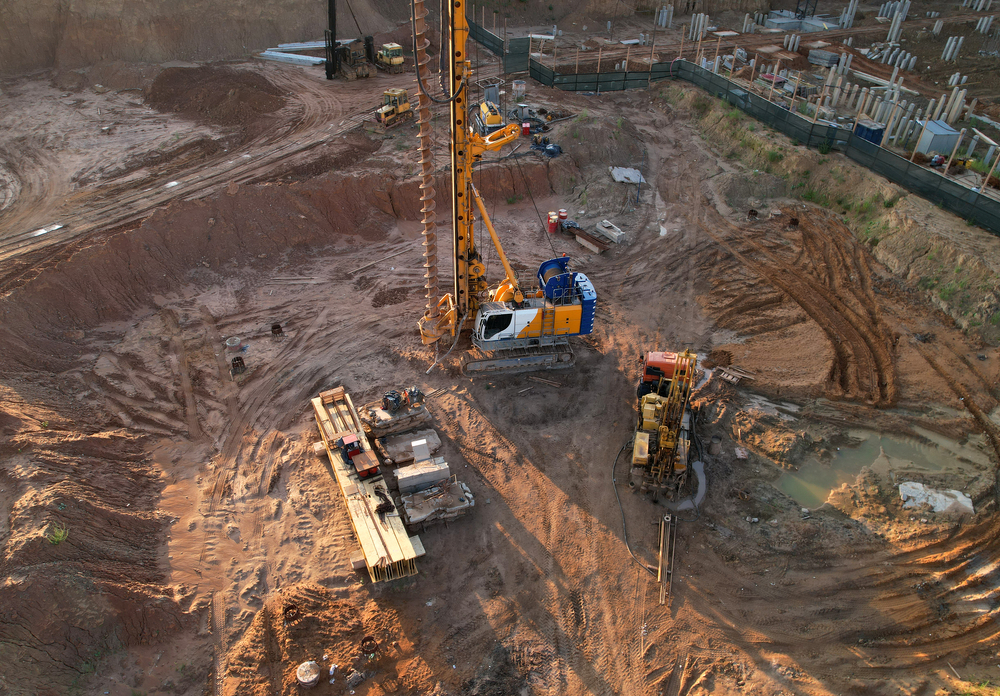Excitement About Geotheta
Excitement About Geotheta
Blog Article
9 Easy Facts About Geotheta Described
Table of ContentsThe smart Trick of Geotheta That Nobody is Talking AboutThe Of GeothetaThe smart Trick of Geotheta That Nobody is DiscussingGeotheta - An OverviewGetting The Geotheta To Work

They conduct site examinations, collect samples, do research laboratory tests, and analyze data to evaluate the viability of the ground for building jobs - Consulting Engineers. Based on their searchings for, geotechnical designers offer referrals for structure design, incline stability, keeping structures, and reduction of geotechnical threats. They collaborate with other experts, such as designers, architectural designers, and building and construction groups, to make certain that geotechnical considerations are integrated right into the total task design and application
By examining the actions and homes of soil and rock, they can recognize possible geotechnical threats such as landslides, dirt settlement, or incline instability. Their knowledge assists stop failings or accidents that can jeopardize lives and residential or commercial property. Below are some comprehensive responsibilities and responsibilities of a geotechnical designer: Website Examination: Geotechnical engineers conduct site investigations to gather information on subsurface problems.
They analyze the data to comprehend the homes and actions of the soil and rock, including their strength, permeability, compaction qualities, and groundwater problems. Geotechnical Analysis and Design: Geotechnical designers evaluate the information gathered throughout website examinations to assess the stability and viability of the website for building projects. They execute geotechnical calculations and modeling to evaluate variables such as birthing capacity, negotiation, incline stability, lateral planet stress, and groundwater circulation.
The Geotheta Ideas
Foundation Design: Geotechnical designers play a vital function in making structures that can securely sustain the intended structure. They examine the dirt conditions and tons needs to figure out the proper structure kind, such as superficial foundations (e.g., footings), deep structures (e.g (https://www.dreamstime.com/ianhammond2191_info)., stacks), or specialized strategies like dirt renovation. They think about elements such as negotiation limits, bearing ability, and soil-structure interaction to develop optimum foundation designs
They examine building and construction strategies, monitor website activities, and conduct area evaluations to confirm that the design suggestions are complied with. If unforeseen geotechnical problems arise, they analyze the scenario and offer recommendations for removal or adjustments to the layout. Threat Analysis and Reduction: Geotechnical designers evaluate geotechnical dangers and risks connected with the project website, such as landslides, liquefaction, or dirt disintegration.

Collaboration and Interaction: Geotechnical designers function carefully with other experts associated with a job, such as engineers, architectural engineers, and building and construction teams. Reliable interaction and collaboration are important to incorporate geotechnical considerations into the general job design and building process. Geotechnical designers provide technological know-how, response questions, and make certain that geotechnical needs are met.
How Geotheta can Save You Time, Stress, and Money.
Right here are some sorts of geotechnical engineers: Structure Engineer: Foundation engineers concentrate on designing and evaluating foundations for structures. They examine the soil conditions, tons demands, and site qualities to establish the most suitable structure type and style, such as shallow foundations, deep foundations, or specialized strategies like stack foundations.
They evaluate the factors influencing slope security, such as dirt residential or commercial properties, groundwater conditions, and incline geometry, and establish techniques to protect against slope failings and mitigate dangers. Earthquake Designer: Quake engineers specialize in examining and creating structures to stand up to seismic forces. They analyze the seismic hazard of a site, evaluate soil liquefaction possibility, and create seismic layout requirements to make certain the safety and resilience of structures during earthquakes.
They do area testing, collect examples, and examine the accumulated data to identify the soil properties, geologic developments, and groundwater problems at a website. Geotechnical Instrumentation Engineer: Geotechnical instrumentation engineers concentrate on tracking and gauging the behavior of dirt, rock, and structures. They set up and keep instrumentation systems that monitor aspects such as dirt settlement, groundwater levels, slope movements, and structural variations to examine performance and give very early cautions of potential problems.
Not known Details About Geotheta
They carry out tests such as triaxial tests, debt consolidation tests, direct shear examinations, and permeability examinations to gather information for geotechnical analysis and style. Geosynthetics Designer: Geosynthetics engineers focus on the design and application of geosynthetic materials, such as geotextiles, geogrids, and geomembranes. They use these products to boost dirt stability, reinforce slopes, offer water drainage solutions, and control disintegration.
They tend to be investigative people, which means they're intellectual, reflective, and Get More Info inquisitive. They are interested, methodical, sensible, analytical, and rational. Some of them are also social, indicating they're kind, charitable, cooperative, person, caring, handy, understanding, tactful, and pleasant - Tailings Engineer.
In the workplace setting, geotechnical engineers utilize specialized software tools to carry out computations, create layouts, and evaluate information. They prepare reports, testimonial job requirements, interact with clients and employee, and coordinate task tasks. The workplace setting provides a conducive environment for research study, analysis, and collaboration with various other experts associated with the task.
The smart Trick of Geotheta That Nobody is Talking About
They often check out task websites to conduct website examinations, analyze geotechnical conditions, and gather data for analysis. These gos to include taking a trip to various locations, occasionally in remote or challenging terrains. Geotechnical designers might do dirt sampling, conduct tests, and screen building activities to make certain that the geotechnical facets of the job are being executed correctly.
Geotechnical engineers likewise function in specialized geotechnical research laboratories. Geotechnical lab designers work extensively in these settings, handling screening equipment, running instruments, and tape-recording information.
Report this page